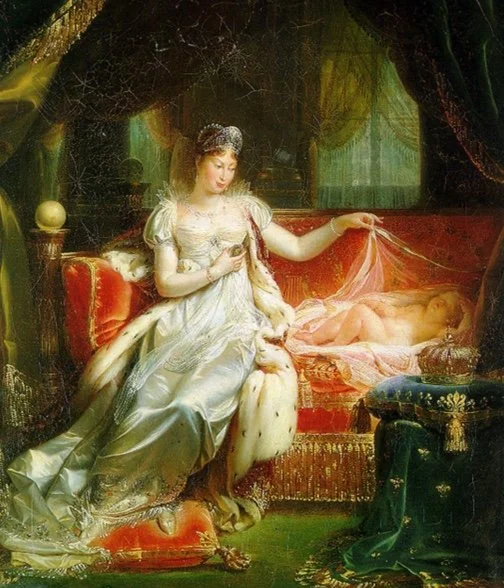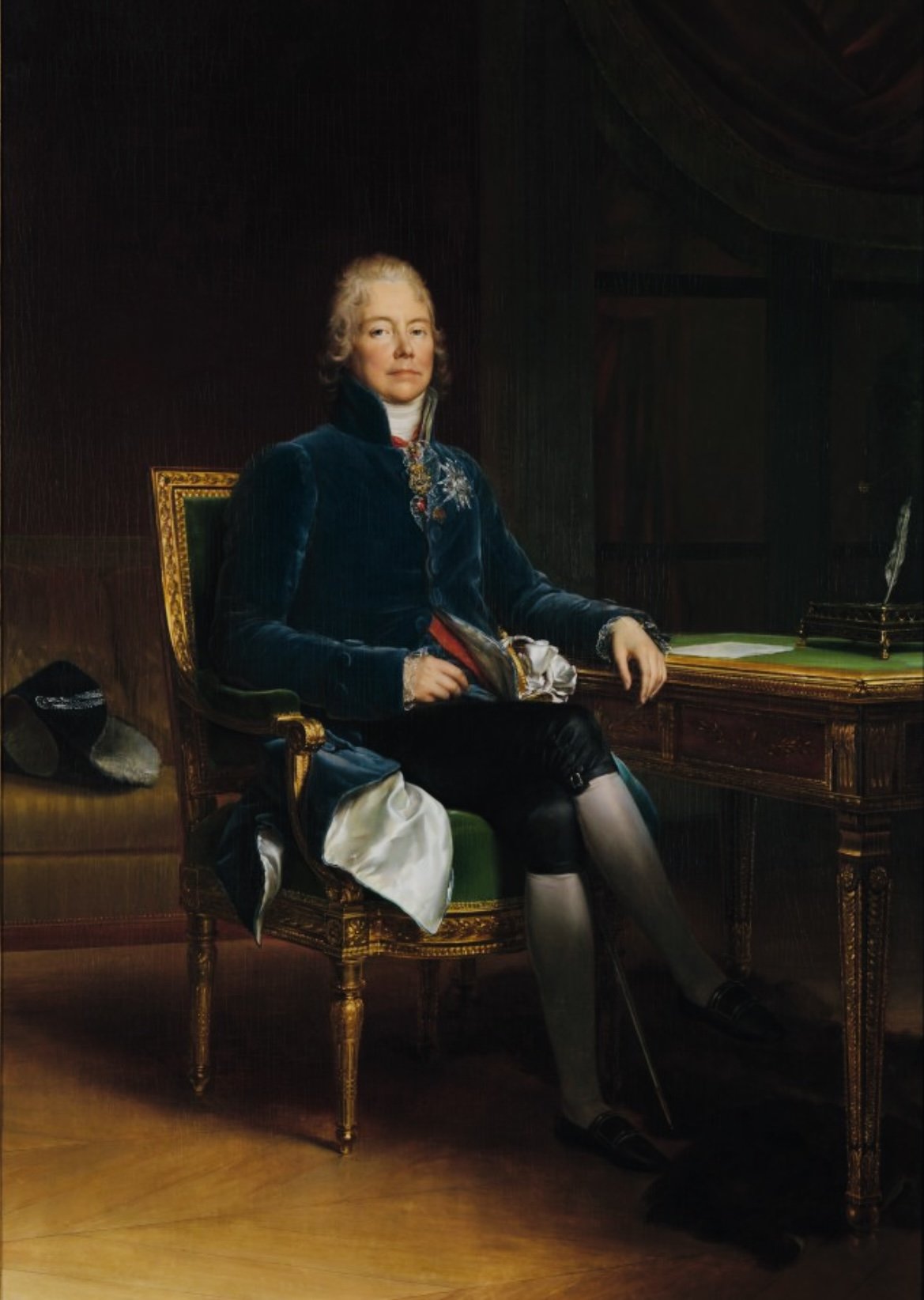Let’s have another look at Hortense’s Memoirs. If you want to read the book it is available for free at the side bar in English and French. Use the widget on the sidebar to translate the text below into pretty much any language.
Hortense shows what it’s like when the global spy system finally takes hold of a nation and installs its puppet rulers and accomplices. Marie Louise’s attendants also are said to have disgraced themselves by flaunting their treasonous ways and intentions.
Hortense takes this opportunity to teach her sons to actually work and make something of themselves by their own efforts. She doesn’t want them to have any part in the grifter mentality of so many whom she had just seen humiliating themselves publicly.
We also just so happen to live under a regime that makes a regular practice of lying about Napoleon and suppressing the truth about him. My project has been proving this beyond a shadow of ANY reasonable doubt for many years now. How have you liked living under the rule of the faction who got rid of Napoleon?
For my part, I will say that I have felt that an honest career in the arts has not open to me under this regime!!!
Learns the patterns and you will know the truth and the truth will set you free.
Hortense’s memoirs continues:
She was quite as ignorant as I of what had taken place in Paris. We soon heard the facts from a servant who had managed to escape. He described the entry of the allied armies which he had witnessed and spoke of the return of the Bourbons that was said to be about to take place.
This information seemed to me bearable after all the horrors my imagination had conjured up. "In other words, it is merely a change of dynasty," I said. "Well, as long as France does not suffer, we must not mind if we are sacrificed."
The calamity thus appeared less serious than I had thought it would be, and my nerves became calmer. But when we heard that among the young women who had hastened most eagerly to greet the foreign invaders there were several who had belonged to the Empress's own household we were deeply grieved that well-born French ladies should behave in a manner which would have made women of the most common class blush.
Our national honor was never dearer to me than in these moments when it was shamed under the very eyes of the enemy." The entourage of the Prince of Benevento [Monsieur de Talleyrand] had been as I learned later the hotbed of this revolution. For a long time, he had been in relations with all the enemies of France through the Princesse de Courlande and the Duc de Dalberg.
He had taken care to have himself arrested at the gate the day he was pretending to follow the Empress and he had spent the night at the house of the Duc de Raguse doubtless encouraging him to commit those acts of treason which took place the following day.
The Duc in making his troops capitulate had dared name as one of his conditions that the life of the Emperor, whose cause his surrender overthrew, should be spared.
Consequently, he was fully conscious of the importance of his acts. How shameful to bargain with the enemy for the life of your commanding officer!
Why was he not at his side, fighting with him? We awaited news of the Emperor with the greatest anxiety. It was at the Cour de France that he heard of the capitulation of Paris.
Alone and without troops, he could not proceed and he returned to Fontainebleau. Monsieur de Maussion, one of the accountants employed by the Duc de Bassano, was the first to give my mother news of what had taken place.
In the middle of the night she entered my room and all in tears threw herself on my bed as she exclaimed: "Poor, poor Napoleon, he is being sent to the island of Elba. How unhappy he will be . . . If it were not for his wife I should go and shut myself up with him."
I saw how deeply she still loved him and thought bitterly how much courage she had needed in order to leave his side.
Monsieur de Maussion gave us additional details regarding the tragic events which had taken place. During his narrative my mother's attention seemed absorbed only by the Emperor's misfortunes. His fate grieved us deeply, but so far as I personally was concerned the news that the Bourbons had been recalled to the throne of France, that peace was about to be signed, that the nation as a whole seemed contented, and that we did not have to bewail the loss of any of those whom we loved—all this appeared a happy solution compared with the disasters I had feared a short time before.
It is easy enough to console oneself for the loss of wealth and of a royal crown. Human mishaps carry with them the power of ennobling the soul of the person on whom they fall. That soul becomes proud and contented beneath their blows, it is no longer wounded by them and it seems as though one's moral stature grew as one's social position decreased.
Always inclined to be hasty in making my decisions I already concluded that I had lost all my possessions in France, that the only fortune I now owned was my diamonds, and that with them I should go off to Martinique and settle down there in a little house which still belonged to my mother.
How glad I was to have instilled in my children from their earliest years those principles which fortify men against the vicissitudes of life! I took advantage of the present circumstances to accustom them not to count on anything except what they could obtain by their own efforts.
I found a kind of pleasure in depicting our lot to them in the darkest colors and ended up by saying with a smile: "My children, you are nobodies now. No longer do you possess kingdoms, or principalities, or dukedoms. Perhaps it is best for you that this should have happened, but in order to make it so you must be obedient and when hard."
Already when the enemy drew near, in order to make them share in the public misfortunes, I had suppressed their dessert at dinner, and they had accepted this little privation very willingly. Now again my son replied, "Mama, if you want me to, be a soldier, and some day perhaps I'll be a colonel."
“Alas," I answered deeply moved, "perhaps you will never be able to fight for France."
“If that is so, mama," he answered immediately, "I shall never fight against France." My only answer was to pick him up and kiss him. His brother inquired if he could no longer have his wooden rocking-horse.
I told him he must give it up, and he never mentioned it again. Mademoiselle Cochelet, to whom I mentioned my idea of taking refuge in Martinique, made me promise to keep her with me no matter what became of me.
She and Monsieur de Maussion went off to Paris to attend to my affairs there.
Although we were always anxious to obtain further details regarding the Emperor, we had only such news as was to be found in the newspapers which a groom who had remained at Malmaison forwarded to us.
These papers were so filled with insulting remarks about the Emperor that the Empress felt indignant as well as wounded by their attitude.
“Let them accuse him of being too fond of glory, of being too ambitious, but at least they should not slander him about other matters regarding which I know more than anyone else," she exclaimed and she went on to explain warmly all the misstatements contained in the papers.
To me the Emperor already seemed too much a historic figure to be affected by remarks printed in some newssheet or other, no matter how eloquent those remarks might be. The only thing that pained me was to see Frenchmen reviling in his misfortune the man whom they had acclaimed when he was successful.
We, like the rest, had for years found fault with him for the incessant wars for which we perhaps wrongly held him responsible.
If we were mistaken in this it was because his power so dazzled us that we were inclined to consider him the source both of conflict and of peace throughout the world. Indeed, our cause itself lost some of its appeal on account of our mistaken idea that by demanding so much from.
The original French is available below:









